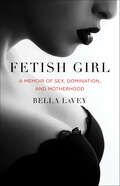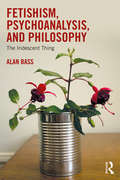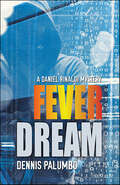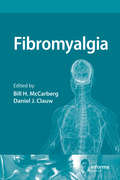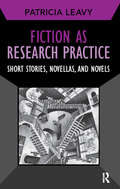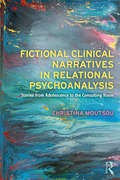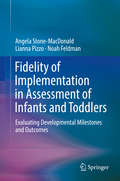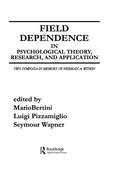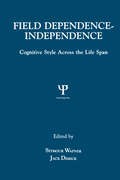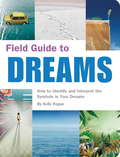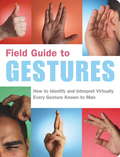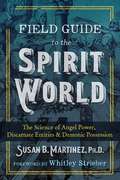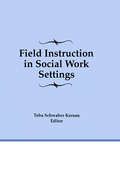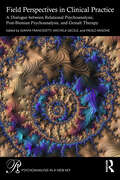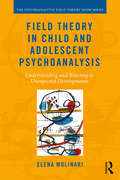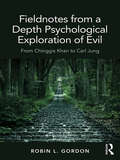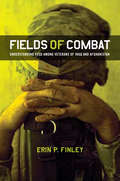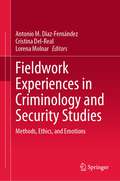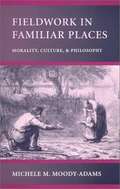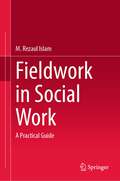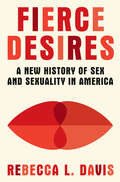- Table View
- List View
Fetish Girl: A Memoir of Sex, Domination, and Motherhood
by Bella LaVeyFetish Girl is a provocative, dark, and erotic memoir that tells it like it is. LaVey pulls readers into her evolving journey: dancer to stripper to dominatrix to erotic wrestler to BDSM aficionado—and all of this while being a single mother trying to do right by her son. This true story doesn’t hold back from diving into these subcultures with a keen eye for the kinky, for the sexy, for the power of taking a risk. “Fans of the Fifty Shades series will undoubtedly find much to savor in this ribald, risqué, and captivating remembrance.” —Kirkus Review
Fetishism, Psychoanalysis, and Philosophy: The Iridescent Thing
by Alan BassFetishism, Psychoanalysis, and Philosophy explores how and why Freud’s late work on fetishism led to the beginnings of a re-formulation of the theory and practice of psychoanalysis. Freud himself, however, was unaware of the long history of the concept of fetishism, a history crucial to understanding the concept. This book contains three main thrusts. One is historical, tracing the development of the concept of fetishism from the 16th century onwards. The focus here is on two important thinkers: Charles de Brosses from the 18th century, and Auguste Comte from the 19th. The second thrust is philosophical. Fetishism is always about the relation between the mind and things. Martin Heidegger, Jaques Derrida, and Maurice Merleau-Ponty have made essential contributions in this area, contributions which have important scientific relevance. The third thrust integrate the historical, philosophical, and psychoanalytic investigations of fetishism. It also looks at Wallace Stevens’ poetic meditation on mind and thing, which helps to illuminate everything that precedes. This comprehensive book features careful integration of the historical, philosophical, and psychoanalytic investigations of fetishism. It will contribute to opening new ways of thinking about the mind and how it is structured, so that fetishism is possible. Fetishism, Psychoanalysis, and Philosophy will appeal to psychoanalysts and psychoanalytic psychotherapists as well as philosophy scholars.
Fever Dream: A Daniel Rinaldi Mystery (Daniel Rinaldi Thrillers #2)
by Dennis PalumboOn a blistering summer day, a bank robbery goes wrong, resulting in the deaths of all the hostages except Treva Williams. Pittsburgh psychologist and trauma expert Daniel Rinaldi is called in by the police to treat Treva. Soon an unforeseen series of events plunges the investigating officers, Sergeant Harry Polk, Detective Eleanor Lowrey, and Rinaldi into a vortex of mistaken identity, kidnapping, and surprising revelations about District Attorney Leland Sinclair's gubernatorial campaign. Is Sinclair somehow involved in the bank case?Rinaldi's attention is diverted by the suicide of a young patient and his growing attraction to Eleanor, as the recently-divorced Harry Polk spirals into an alcohol-driven, self-destructive free-fall. Then sudden death threats against Sinclair fuel a new frenzy of accusations and political maneuvering, and Rinaldi begins to make connections. Soon, what he knows—or thinks he knows—will pull him toward a shocking and possibly lethal confrontation.
Fibromyalgia
by Bill H. McCarberg Daniel J. ClauwUtilizing evidence-based research, this revolutionary source explores the difficult diagnosis and management of the controversial syndrome of fibromyalgia. Carefully guiding physicians through the steps leading to diagnosis, Fibromyalgia emphasizes targeting the underlying fibromyalgia syndrome rather than treating each of its symptoms individually
Fiction as Research Practice: Short Stories, Novellas, and Novels (Developing Qualitative Inquiry #11)
by Patricia LeavyThe turn to fiction as a social research practice is a natural extension of what many researchers and writers have long been doing. Patricia Leavy, a widely published qualitative researcher and a novelist, explores the overlaps and intersections between these two ways of understanding and describing human experience. She demonstrates the validity of literary experimentation to the qualitative researcher and how to incorporate these practices into research projects. Five short stories and excerpts from novellas and novels show these methods in action. This book is an essential methodological introduction for those interested in studying or practicing arts-based research.
Fictional Clinical Narratives in Relational Psychoanalysis: Stories from Adolescence to the Consulting Room
by Christina MoutsouFictional Clinical Narratives in Relational Psychoanalysis explores the therapeutic space between the patient and therapist in psychoanalysis and the transformative effect of the therapeutic relationship through a collection of twenty-two short stories beginning at a moment of trauma in adolescence. Christina Moutsou illustrates both contemporary clinical issues as well as the relational and intersubjective nature of the therapy relationship. First, six teenagers narrate in the first person their experience of battling with sexual abuse, eating disorder, body image, the first sexual awakening, loss of a parent and the intricacies of teenage friendship. The stories then unravel years later as adults in the consulting rooms of Ellie and Jake, two middle-aged therapists working in London. The reader is offered an intimate look at how the therapists work through their personal losses and past wounds, while facing their patients’ conflicts and dilemmas including adoption, bereavement, pregnancy loss, lack of intimacy in the couple relationship and a diagnosis of borderline personality disorder. What distinguishes this collection of fictional clinical narratives is the focus on an internal point of view, where the reader is invited to experience first-hand the tribulations of the psychoanalytic dialogue and the enduring marks that trauma and loss leave on each member of the therapeutic dyad. The focus here is on how narratives are constructed and deconstructed through the intersubjective dance between the therapist and the patient. Both are transformed in the process. The fictional nature of the stories also allows for the exploration of sensitive issues that are difficult or awkward to explore adequately using direct case studies from real-life examples. This fascinating and unusual work provides an innovative method of exploring everyday clinical dilemmas, using an accessible, easy to follow narrative path. It is written from a broadly relational perspective but will appeal to all psychoanalysts and psychoanalytic psychotherapists.
Fidelity of Implementation in Assessment of Infants and Toddlers: Evaluating Developmental Milestones And Outcomes
by Noah Feldman Angela Stone-MacDonald Lianna PizzoThis book examines the challenges in developmental assessment of infants and toddlers and provides best practices for implementing standardized assessments in early intervention settings. It starts with an overview of standardized assessment practices and discusses how specific tools can be used in early intervention for different purposes (e.g., eligibility for services). The book explains the importance of the Fidelity of Implementation of Assessment (FOI-A) approach in creating standardized assessment for infants and toddlers. Chapters provide a checklist-based framework for FOI-A, with details on technological supports for test administration and data collection as well as training and supervision models. In addition, chapters discuss ways of engaging families, gaining their trust, and including them in their children’s educational planning.Topics featured in this book include:The Battelle Development Inventory, 2nd Edition (BDI-2) and its use in the assessment of young children. Using checklists to improve fidelity of implementation for standardized assessments.Using checklists to support early intervention directors and teams.How to provide feedback to early interventionists and other professionals on FOI-A.Recommendations to improve FOI-A.Fidelity of Implementation in Assessment of Infants and Toddlers is a must-have resource for researchers, clinicians and related professionals, and graduate students in varied fields including child and school psychology, pediatrics, social work, behavioral therapy, infant and early childhood development, and early education and care.
Fidelity: 'The book about infidelity that has shaken up Italy - and is coming to Netflix' (The Times)
by Marco MissiroliSOON TO BE A NETFLIX LIMITED SERIES 'An absolute scorcher' Evening Standard'Fidelity thrilled me, made me think and moved me deeply. As deep as any literature and as irresistible as any gossip' Jonathan Safran Foer'Intimate and ultimately moving... completely absorbing'Daily Mail'Cuts right through to the darkness of our inner lives'Roberto Saviano'A gripping novel exploring the tensions in an apparently idyllic marriage' Financial Times 'A must-read'Sydney Morning HeraldCarlo, a part-time professor of creative writing, and Margherita, an architect-turned-real estate-agent: a happily married couple in their mid-thirties, perfectly attuned to each other's restlessness. They are in love, but they also harbour desires that stray beyond the confines of their bedroom: Carlo longs for the quiet beauty of one of his students, Sofia; Margherita fantasises about the strong hands of her physiotherapist, Andrea.But it is love, with its unassuming power, which ultimately pulls them from the brink, aided by Margherita's mother Anna, the couple's anchor and lighthouse - a wise, proud seamstress hiding her own disappointments.But after eight years of repressed desires and the birth of a son, when the past resurfaces in the form of books sent anonymously, will love be enough to save them? A no. 1 international bestsellerSoon to be a Netflix show directed by Andrea Molaioli, director of the Netflix hit series SuburraWinner of the Premio Strega GiovaniShortlisted for the Premio Strega'Powerful, delicate, exquisite' Claudio Magris 'Masterful... The ending is just as good as that of Joyce's The Dead' Corriere della Sera'You'll feel like taking refuge in this book and never leaving its confines' La Stampa'With all-encompassing writing, Marco Missiroli opens the rooms of his characters and the streets of Milan, the thoughts and the concealed desires, makes dialogue and silences reverberate with the spontaneity of great narrators' Il Foglio
Fidget to Focus: Sensory Strategies for Living with ADD
by Roland Rotz Sarah D. Wright"Full of tips and strategies collected over years of shared experiences, Fidget to Focus is a gold mine of information and sometimes surprising, sometimes heart-warming stories about how to stay focused and on track, even when tasks are dull, tedious, and boring." -- Thom Hartmann, author of Attention Deficit Disorder: A Different Perception. Until now, the only way you could learn about the Fidget to Focus approach to successfully living with and managing Attention Deficit Disorder (ADD) was to attend a national conference. The groundbreaking ideas in this book, based on the personal experiences of hundreds of people and recent breakthroughs in neuroscience, will change the way you live with this disorder. Fidget to Focus is a guide to keeping your brain engaged and focused with tools and techniques available to you at any time (workbook included!).
Field Dependence in Psychological Theory, Research and Application: Two Symposia in Memory of Herman A. Witkin
by Mario Bertini, Luigi Pizzamiglio and Seymour WapnerFirst published in 1985. Routledge is an imprint of Taylor & Francis, an informa company.
Field Dependence-independence: Bio-psycho-social Factors Across the Life Span
by Jack Demick Seymour WapnerThe papers presented in this volume seek to illuminate relationships among the cognitive style of field dependence- independence and biological, psychological, and sociocultural aspects of human functioning across the life span. The book begins by addressing fundamental issues concerning the role of cognitive style in human development. The remainder of the text treats cognitive style in relation to biological, psychological, and sociocultural functioning. Also included is a summary of directions for future research.
Field Exercises: How Veterans Are Healing Themselves through Farming and Outdoor Activities
by Stephanie WestlundHow connecting with nature is helping veterans reintegrate into civilian life and recover from PTSD.There are nearly twenty-five million veterans and active-duty soldiers in North America. Some experts estimate that more than one quarter of these men and women suffer from post-traumatic distress, and many other military persons experience difficulty reintegrating into civilian life. While conventionally prescribed treatments primarily involve medication and therapy, many people are discovering additional ways to manage their injuries and reduce their suffering.Field Exercises: How Veterans Are Healing Themselves through Farming and Outdoor Activities shares the compelling stories of men and women who are finding relief from stressful and traumatic military experiences, while also establishing community networks and other peer support initiatives. Stephanie Westlund examines:The deep and far-reaching connections between nature and human healthThe tremendous impact of stress and trauma on survivors' livesResources and groups providing opportunities in the emerging field of “Green Care”.Field Exercises offers hope for veterans searching for methods to ease the transition to civilian life and recover from military stress and trauma. This book will appeal to millions of North American soldiers, veterans, and their loved ones, doctors, psychiatrists, social workers and other caregivers, other groups struggling with high rates of stress and post-traumatic experience, and all those interested in the relationship between nature and human health.Stephanie Westlund holds a PhD in peace and conflict studies. She has been conducting research with veterans since 2009, and continues to be inspired by their courage and personal resolve to move through pain toward recovery, and their unrelenting desire to serve their communities.
Field Guide to Dreams
by Kelly ReganAt last, a field guide to identifying and interpreting dream symbols, from falling to flying! Dreams can be mysterious, exhilarating, and terrifying--but they don't have to be confusing. With Field Guide to Dreams, you'll unravel the hidden meanings behind these mysterious subconscious messages. For example, you may find yourself naked in front of your high school classroom during a time of great change--perhaps you're feeling insecure about a decision you recently made. Of if you find buried treasure in a dream, you may have hidden talents or knowledge. Organized by dominant symbol (animals, caves, hospitals, teachers, and so on), each full-color image refers to a complete dream description. This book gives you clues to a dream's meaning and explains the significance of having the same dream time and again. You'll hear what Freud and Jung might say about a particular vision and discover a dream's sometimes strange, often illuminating, historical and cultural context. With Field Guide to Dreams at your bedside, you'll never wonder if that cigar was just a cigar!
Field Guide to Gestures
by Nancy Armstrong Melissa WagnerFinally, a field guide to interpreting more than 100 international gestures, from the wave to the finger, from the shrug to the nod. Here's easy access to the essential information about common (and some not-so-common) gestures you may encounter at home or abroad. Field Guide to Gestures is organized into handy sections for quick reference when time is of the essence and interpretation is everything. If a man bends his torso forward when meeting you, turn to the "Arrival/Departure" chapter to learn more about the bowing gesture. When the woman at the end of the bar flips her hair and looks your way, turn to the "Mating" chapter to learn just what she's trying to say. And if your friend has intertwined his index finger and middle fingers as the night's lottery numbers are being read, go to "No Words Needed" to learn more about the crossed fingers gesture. This practical guide includes more than 100 full-color photographs of the world's most common gestures, plus cross-referenced descriptions throughout, including historical background and common usage. Helpful step-by-step directions and detailed line drawings teach you how to perform each gesture correctly.
Field Guide to the Spirit World: The Science of Angel Power, Discarnate Entities, and Demonic Possession
by Susan B. MartinezA comprehensive examination of the many ways the spirit world affects the material plane and our minds • Provides a detailed guide to the Afterlife and its inhabitants • Reveals the spirit influence behind many mental disorders as well as psi abilities and creative genius • Includes checklists of symptoms of spirit “overshadowing,” methods from the world’s top exorcists, and instructions on how to free unwanted spirits from the material plane We are spirits housed in a body, and just as houses can be haunted, so can people. When the living succumb to dissociative states of consciousness, they become a magnet for lost but clinging spirits. Known as jinn, dybbuk, daemon, wuqabi, or simply the undead, they hover unseen on the earth plane, ready to inhabit the most suitable body available. Documenting the life of wandering spirits and their impact on vulnerable human targets, Susan Martinez offers a radical departure from the standard psychological explanations for a host of pathological behaviors--including multiple personality, autism, epilepsy, migraines, obsessive compulsive disorder, depression, schizophrenia, anxiety, PTSD, self-destructive urges, and strange outbursts--and reveals that hallucinations are often true impressions of spirit input. Martinez explains how mental health comes down to the delicate balance between self-control and spirit-control. When trauma triggers an escape response, the soul takes flight, leaving the mind susceptible to possession by discarnate entities. However, the spirit world can also bestow gifts upon those whose psyches are open, such as in the case of mediums, shamans, people who communicate with angels, and many of the world’s creative geniuses. Martinez presents “overshadowing” by spirits as a universal, cross-cultural phenomenon, documenting modern and traditional accounts as well as corroborating indigenous beliefs. She examines soul decay, soul travel both before and after death, as well as how knowledge of the spirit world can offer positive treatments for disorders like schizophrenia and autism. Providing a detailed guide to the spirit world and its inhabitants, the author offers checklists of symptoms of “overshadowing,” methods from the world’s top exorcists, and instructions on how to free spirits so they can continue their journey into the beyond--all the tools necessary to forearm us against soul snatchers and other enemies of the Light.
Field Instruction in Social Work Settings
by Toba Schwaber KersonField Instruction in Social Work Settings explores the relationship between field instruction and the setting in which it occurs. The book asserts that certain aspects of social work, including laws, funding, political climate, organizational policies, and values, affect the relationship between student and field instructor and shape teaching and learning. The book explores dimensions of the student/field instructor relationship such as goals and expectations, development of professional identity, uses of the self, issues of diversity, authority, dependency, autonomy, value dilemmas, and the structure of supervision. It presents a framework for teaching field instruction and uses the framework to explore its relevance, meaning, and use in the following settings: perinatal AIDS program public child welfare child advocacy agency public school occupational health and safety project family service psychiatric hospital case management program for the elderly day center for the elderlyField Instruction in Social Work Settings is the only book available relating field instruction to the specific context in which it occurs. It recognizes the social work field’s diminished budget and increased demands and points out the critical necessity of students learning to address and manage policy and organizational issues as they develop their social work skills. This book is an aid to field instructors balancing increases in enrollment and curriculum content and decreases in placements and budgets. It integrates all of these concerns with field practice and seeks to provide a model for those working in the field as instructors and students. Field Instruction in Social Work Settings applies classroom material to social work settings and emphasizes the value of field instruction by relating it to the branches of child welfare, mental health, and health care. It allows the reader to integrate social work policy and advocacy with field work, and it provides the reader with an appreciation of how social work and field instruction can work together directly.
Field Perspectives in Clinical Practice: A Dialogue between Relational Psychoanalysis, Post-Bionian Psychoanalysis, and Gestalt Therapy (Psychoanalysis in a New Key Book Series)
by Michela Gecele Gianni Francesetti Paolo MigoneThis book is the outcome of fruitful engagement between relational psychoanalysis, neo-Bionian psychoanalysis, and Gestalt therapy on a contemporary growing edge of clinical practice: field theory.What is happening in contemporary clinical practice that seems to be pushing theories towards a field perspective? Clinical issues are complex phenomena—they cannot be separated from social and cultural changes. Suffering, clients, and therapists change over time, and with them so do the needs and theoretical approaches of clinical professionals, so as to be able to update and adjust care practices.This book is an independent, yet common study, which through the field concept explores what complexity theories and dynamic systems theories have described as “emerging phenomena,” or what phenomenological philosophy categorized as phenomenal field, pathic aesthetics, and atmospherology, or, more generally, our understanding of the relationship between clinical practice and critical thinking and of the centrality of the individual, as developed by postmodern thinkers.With multiple professional perspectives and essential clinical material, this is key reading for psychoanalysts and psychotherapists.
Field Theory in Child and Adolescent Psychoanalysis: Understanding and Reacting to Unexpected Developments (Psychoanalytic Field Theory Book Series)
by Elena MolinariField Theory in Child and Adolescent Psychoanalysis looks at the intersection of two types of psychoanalysis that challenge the classic model; child analysis, and field theory. Children impose a faster pace on the analysis and a much less stable structure than adults, whilst psychoanalytic field theory looks at the patient-analyst relationship in a much wider context than is typical. By combining these two approaches, this book advocates the use of a set of tools and techniques that allow the psychoanalyst to understand and react much faster than normal, and to be better prepared for unexpected developments. This book shows the reader how to navigate smoothly and steadily through passages of tense analytical situations, which might otherwise feel like being trapped in a maze with no obvious way out. Bion's writings allowed the improvement of new techniques or instruments for exploring the psychoanalytical process. Discussion about technique is a hugely important and necessary step for improving the evidence base of psychoanalytic psychotherapy. This book also seeks to improve the research in therapeutic effectiveness and unexpected relations between body and mind, emotions and dreams. By doing so, Elena Molinari contributes to expanding the perspectives that child and adolescent psychoanalysts have had in exploring primitive functioning of the mind. With specific emphasis on working with difficult situations and patients, Field Theory in Child and Adolescent Psychoanalysis is a highly practical book that will appeal greatly to child psychoanalysts and psychoanalytic psychotherapists, as well as psychologists, paediatricians and advanced students studying across these fields.
Fieldnotes from a Depth Psychological Exploration of Evil: From Chinggis Khan to Carl Jung
by Robin L. GordonIn Fieldnotes from a Depth Psychological Exploration of Evil, Robin L. Gordon presents an accessible account of an attempt to define and understand the nature of evil. Gordon takes on the role of guide to this confusing land, tying together threads of Jungian theory, philosophy, etymology, neuroscience and history, as we are led on a personal journey of discovery. Gordon begins by analysing what a twelfth-century meeting between Chinggis Khan and Taoist priest Ch’ang-Ch’un can tell us about the presence of opposing traits and the nature of evil in human beings. We learn what depth psychology has said about evil and the shadow part of our psyches, and examine examples of human behaviour throughout history to understand the etymological, philosophical and historical understandings and definitions of evil. Gordon’s own relationship with her work, and the feelings that arise when researching the psychological framework of Nazi doctors, genocide in Rwanda, Bosnia and Syria, and the functionality of serial killers, are interrogated. We then return to Chinggis Khan’s and Ch’ang-Ch’un’s relationship, attempting to build a real and practical definition of "evil", and assessing their dialogues as a metaphor for Jung’s views of the transcendent function. Fieldnotes from a Depth Psychological Exploration of Evil will be essential reading for academics and students of Jungian and post-Jungian studies, sociology, criminology and philosophy. It will also be a key resource for Jungian analysts and psychotherapists interested in the study of evil and its impact on society and the psyche, as well as anyone investigating and redefining their own meanings of evil, past and present.
Fields of Combat: Understanding PTSD among Veterans of Iraq and Afghanistan (The Culture and Politics of Health Care Work)
by Erin P. Finley"If you consider Iraq—like I do, probably twenty-nine out of thirty days—to be the pinnacle of your life, then where do you go from there? And I'm sure that a lot of veterans feel that way. To them, that was it. That was everything. So now what? They have to find something meaningful and purposeful.""When I got back from Afghanistan, there was not even so much as a briefing that said, 'Let us know if you're having problems.' There wasn't so much as a phone number. There was literally nothing.""I knew it was crazy. I was thinking, the guy on the roof's either a sniper or he's going to radio ahead. And then I thought, this is San Antonio. There's not snipers on the roof, nobody's going to blow me up here.""Whenever I look at people back here at home, I know what they're going to look like dead. I know what they look like with their brains blown out or jaws blown off or eyes pulled out. When I look at somebody I see that, to this day."—Voices of veterans interviewed in Fields of CombatFor many of the 1.6 million U.S. service members who have served in Iraq and Afghanistan since 2001, the trip home is only the beginning of a longer journey. Many undergo an awkward period of readjustment to civilian life after long deployments. Some veterans may find themselves drinking too much, unable to sleep or waking from unspeakable dreams, lashing out at friends and loved ones. Over time, some will struggle so profoundly that they eventually are diagnosed with post-traumatic stress Disorder (PTSD).Both heartbreaking and hopeful, Fields of Combat tells the story of how American veterans and their families navigate the return home. Following a group of veterans and their personal stories of war, trauma, and recovery, Erin P. Finley illustrates the devastating impact PTSD can have on veterans and their families. Finley sensitively explores issues of substance abuse, failed relationships, domestic violence, and even suicide and also challenges popular ideas of PTSD as incurable and permanently debilitating. Drawing on rich, often searing ethnographic material, Finley examines the cultural, political, and historical influences that shape individual experiences of PTSD and how its sufferers are perceived by the military, medical personnel, and society at large. Despite widespread media coverage and public controversy over the military's response to wounded and traumatized service members, debate continues over how best to provide treatment and compensation for service-related disabilities. Meanwhile, new and highly effective treatments are revolutionizing how the Department of Veterans Affairs (VA) provides trauma care, redefining the way PTSD itself is understood in the process. Carefully and compassionately untangling each of these conflicts, Fields of Combat reveals the very real implications they have for veterans living with PTSD and offers recommendations to improve how we care for this vulnerable but resilient population.
Fieldwork Experiences in Criminology and Security Studies: Methods, Ethics, and Emotions
by Antonio M. Díaz-Fernández Cristina Del-Real Lorena MolnarThis book compiles the fieldwork experiences of 55 researchers, addressing the challenges, ethical considerations, and methodologies employed to study 30 diverse populations and phenomena within Criminology and Security Studies. This volume contributes to filling a gap in academic literature by highlighting the often unspoken realities and intricacies of fieldwork. The book is systematically structured into five thematic sections: The Powerful, The Invisible, The Vulnerable, The Violent, and The Cyber. These categories encompass various aspects and dimensions of fieldwork, including managing emotional distress, negotiating access through gatekeepers, ensuring the protection of informants, and exercising discretion in navigating sensitive issues. As a scholarly resource, this book is invaluable for academics, practitioners, and students involved in criminology, security studies, anthropology, sociology, and political science. By offering in-depth reflections and insights, this volume enhances the reader’s understanding of the nuances of fieldwork, and informs the development of robust and ethical research practices.Chapters 2, 9 and 11 are available open access under a Creative Commons Attribution 4.0 International License via link.springer.com.
Fieldwork In Familiar Places: Morality, Culture, And Philosophy
by Michele M. Moody-AdamsThe persistence of deep moral disagreements--across cultures as well as within them--has created widespread skepticism about the objectivity of morality. Moral relativism, moral pessimism, and the denigration of ethics in comparison with science are the results. Fieldwork in Familiar Places challenges the misconceptions about morality, culture, and objectivity that support these skepticisms, to show that we can take moral disagreement seriously and yet retain our aspirations for moral objectivity. Michele Moody-Adams critically scrutinizes the anthropological evidence commonly used to support moral relativism. Drawing on extensive knowledge of the relevant anthropological literature, she dismantles the mystical conceptions of "culture" that underwrite relativism. She demonstrates that cultures are not hermetically sealed from each other, but are rather the product of eclectic mixtures and borrowings rich with contradictions and possibilities for change. The internal complexity of cultures is not only crucial for cultural survival, but will always thwart relativist efforts to confine moral judgments to a single culture. Fieldwork in Familiar Places will forever change the way we think about relativism: anthropologists, psychologists, historians, and philosophers alike will be forced to reconsider many of their theoretical presuppositions. Moody-Adams also challenges the notion that ethics is methodologically deficient because it does not meet standards set by natural science. She contends that ethics is an interpretive enterprise, not a failed naturalistic one: genuine ethical inquiry, including philosophical ethics, is a species of interpretive ethnography. We have reason for moral optimism, Moody-Adams argues. Even the most serious moral disagreements take place against a background of moral agreement, and thus genuine ethical inquiry will be fieldwork in familiar places. Philosophers can contribute to this enterprise, she believes, if they return to a Socratic conception of themselves as members of a rich and complex community of moral inquirers.
Fieldwork in Humanities Education in Singapore (Studies in Singapore Education: Research, Innovation & Practice #2)
by Teddy Y. H. Sim Hwee Hwang SimThis book addresses the topic of humanities education fieldwork using the Singapore context as its primary focus. It explores how the thought processes behind and techniques of various humanities and social sciences subjects can be applied to fieldwork in a variety of school and training settings. In addition, it discusses how humanities students and educators could stand to benefit from utilizing fieldwork techniques and skills used in archaeology and anthropology, beyond undergraduates majoring in that discipline. Finally, the adoption of multidisciplinary approaches in fieldwork incorporating history, geography, literature and social studies demonstrate how these subjects can collaborate together in actual case studies to facilitate participants’ learning in the field.
Fieldwork in Social Work: A Practical Guide
by M. Rezaul IslamThis book is an essential resource meticulously designed for social work field placements. It offers students a structured pathway through the intricacies of real-world social work, equipping them with invaluable guidance, knowledge, and practical tools for success. Beginning with foundational concepts such as the meanings and scope of social work, the text progresses seamlessly into specialized topics like data collection, supervision, and challenges in fieldwork practices. Addressing critical aspects of social work field practice, the book delves into the significance of fieldwork, setting clear objectives, ethical considerations, and the roles and responsibilities of social workers. It navigates through diverse assignments and duties, emphasizing ethical dimensions, adaptability, client-centered approaches, and the integration of technology. Chapters on culturally responsive practices and professional skill development underscore essential competencies for effective interventions. With a global perspective, the book integrates examples and case studies from various countries, providing a comprehensive understanding of social work in diverse contexts. Additionally, it includes discussions on agency-level field practice, collaborative goal setting, evidence-based practices, and technology integration, reflecting the evolving landscape of social work and preparing students for contemporary challenges. Emphasis on reflective practice, learning, and report writing enhances students' skills for the transition from field placement to professional practice. Fieldwork in Social Work: A Practical Guide serves as an indispensable tool for both students and practitioners, empowering them to navigate the complexities of social work practice with confidence. Suitable for undergraduate and graduate social work students, it offers essential companionship throughout their fieldwork journey. Social work educators, field instructors, and supervisors will also find value in its structured framework for teaching, guiding, and supporting students. With its global perspective and coverage of emerging trends, the book remains a valuable resource for practitioners seeking to stay updated with the latest developments in the field.
Fierce Desires: A New History of Sex and Sexuality in America
by Rebecca L. DavisFrom an esteemed scholar, a richly textured, authoritative history of sex and sexuality in America—the first major account in three decades. Our era is one of sexual upheaval. Roe v. Wade was overturned in the summer of 2022, school systems across the country are banning books with LGBTQ+ themes, and the notion of a “tradwife” is gaining adherents on the right while polyamory wins converts on the left. It may seem as though debates over sex are more intense than ever, but as acclaimed historian Rebecca L. Davis demonstrates in Fierce Desires, we should not be too surprised, because Americans have been arguing over which kinds of sex are “acceptable”—and which are not—since before the founding itself. From the public floggings of fornicators in early New England to passionate same-sex love affairs in the 1800s and the crackdown on abortion providers in the 1870s, and from the movements for sexual liberation to the recent restrictions on access to gender affirming care, Davis presents a sweeping, engrossing, illuminating four-hundred-year account of this nation’s sexual past. Drawing on a wealth of sources, including legal records, erotica, and eighteenth-century romance novels, she recasts important episodes—Anthony Comstock’s crusade against smut among them—and, at the same time, unearths stories of little-remembered pioneers and iconoclasts, such as an indentured servant in colonial Virginia named Thomas/Thomasine Hall, Gay Liberation Front cofounder Kiyoshi Kuromiya, and postwar female pleasure activist Betty Dodson. At the heart of the book is Davis’s argument that the concept of sexual identity is relatively novel, first appearing in the nineteenth century. Over the centuries, Americans have shifted from understanding sexual behaviors as reflections of personal preferences or values, such as those rooted in faith or culture, to defining sexuality as an essential part of what makes a person who they are. And at every step, legislators, police, activists, and bureaucrats attempted to regulate new sexual behaviors, transforming government in the process. The most comprehensive account of America’s sexual past since John D’Emilio and Estelle Freedman’s 1988 classic, Intimate Matters, Davis’s magisterial work seeks to help us understand the turmoil of the present. It demonstrates how fiercely we have always valued our desires, and how far we are willing to go to defend them.
